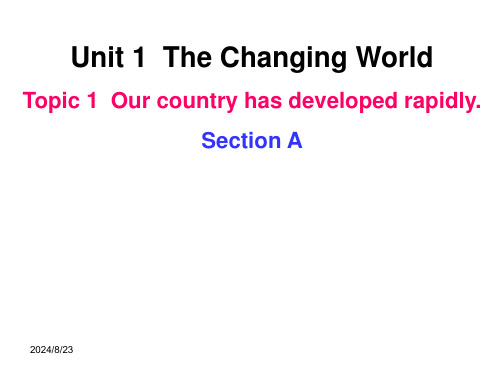仁爱英语九年级上册课件 Unit 1 Topic 3 section C
九年级英语上册 仁爱版.ppt课件

1.--Have you found him yet ? --Yes ,he has already gone home. yet, already 是副词,表示“已经,仍然, 还 ”。 already 多用于现在完成时态的肯定 句,可放在句中,也可放在句末。 yet常用在 现在完成时态的否定句和疑问句, 常放在句 末。 【链接】never 多用于否定陈述句,ever 多用 于疑问句,问初次经历,just 位于谓语动词 以后,before 一般放在句末。
Read 3a again and then mark (T) forTrue of (F) for False. (T )1.Kangkang thinks that China developed slowly in the past. (T ) 2.China has a larger population than any other country in the world. ( F) 3.China is developing more slowly than before because of China’s one-child policy. (T ) 4.Maria thinks it’s bad to be a “Little Emperor”. ( F) 5.It’s possible that Kangkang’s father was the only child in his family.
just already yet ever never
A: Have you ever been to France ? B: No, I have never been to any European . But Michael has just come back from France. He likes it very much. He says he has neverseen such a beautiful country before. A: Have you seen himyet ? B: Yes, I have already seen him.
仁爱英语九年级上册Unit1Topic1详细解读(共26张PPT)

“公共汽车来了。” (完全倒装) _H__e_re__h_e_c_o_m__e_s. “他来了。” (局部倒装)
3. Though I had no time to travel, I still felt very happy. 意思是“尽管我没时间去旅游,但我仍然感到很
Section B 1. 从……当中学习___l_e_a_rn_…__f_r_o_m_…____________ 2. 没有时间做某事___h_a_v_e_n_o__t_im__e_t_o_d_o__st_h_.____ 3. 表演有趣的节目_p_u_t _o_n_f_u_n_n_y_/i_n_t_er_e_s_ti_n_g_s_h_o_w__s 4. 一群老年人 _______a_g_r_o_u_p_o_f_o_l_d_p_e_o_p_l_e______ 5. 一些有意义的事___s_o_m__et_h_i_n_g_m__ea_n_i_n_g_f_u_l ____ 6. 上网聊天 _________c_h_a_t _o_n_li_n_e______________ 7. 跳绳 _____________ju_m__p_r_o_p_e_______________
Section D 1. (在……)发挥重要作用
____p_l_a_y_a_n__im__p_o_r_ta_n_t_p_a_r_t/_ro_l_e_(_i_n_.._.)___ 2. 下棋___________p_l_a_y_c_h_e_s_s___________ 3. 在某人空闲时间__in__o_n_e’_s_s_p_a_r_e/_f_re_e__ti_m_e_ 4. ……和……都___b_o_t_h__…__an_d_…__________ 5. 近几年_________i_n__re_c_e_n_t_y_e_a_rs________ 6. 出国旅游_______m__a_k_e_a__to_u_r_a_b_r_o_a_d____
仁爱版 初三英语九年级上册Unit1 Topic1PPT课件

Topic 1 Our country has developed rapidly. Section A
2024/8/23
2024/8/23
2024/8/23
• have/has been to…去过。。。 • He has been to Hubei. • 他去过了湖北 (人已经不在湖北) • I have been to Beijing. • 我去过了北京。(人已经不在北京) • have/has gone to... • 已经去了,它强调主语此时不在说话地点。 • e.g. She has gone to Hubei. • 她已经去了湖北。(人已经不在说话地点) • She has gone to Beijing. • 他已经去了北京。 (人已经不在说话地点)
2024/8/23
p124
2024/8/23
Find the sentences with Present Perfect Tense in Section A. Read them aloud.
You have just come back from your hometown.
Great changes have taken place there and my hometown has become more and more beautiful.
2024/8/23
2a TLhisetennetoxtthedcaoyn,vMerasartiiaoncaanmd feillbinatchke .blSanhkes.mTheetn practice it withMyoicurhpaaertlneirn. the school.
Unit1+Topic+3+课文详解课件2023-2024学年仁爱版九年级英语上册

Section B
• Maria: What are you reading, Jane? be动词+V.ing (现在进行时)
• Jane: I’m reading a newspaper from Canada. Martin showed me an interesting article.
街区
事实上=in fact
wonderful place to live. Near our block, there are beautiful parks, good schools,
famous museums and excellent restaurants. And you can go to plays, concerts and
Lesson Three
Topic3 A-B
Words and passages
单词认读
背诵词汇
背诵词汇
词汇 1. with the money 2. so that 3. so...that... 4. in fact/as a matter of fact 5. come for a visit 6. in need 7. decide on sth. 8. provide sth. for sb./provide sb. with sth. 9. feel good about... 10. lend sth. to sb/lend sb. sth.
It is about a program that helps homeless people. show sb.sth.= show sth. to sb.
定语从句:从句充当形容词,修饰前面的program
给某人展示某物
仁爱版九年级英语上册 Unit 1 Topic 3 Section C 课件(共28张PPT)

there will be less ____ in the future.
The government in every country has worked for many years to support the homeless but more needs to be done.
1.What is one of the most basic human needs ?
One of the most basic human needs is a home.
2.Do all the people have their homes around the world ?
No, while most people around the world value their homes , there are many people in every country who are homeless .
Because of the wars, they have to live on the streets or in a shelter.
Let's guess.
Why are they homeless?
Because they don't have a job, 挣钱 or because they don't earn enough money.
Scanning--careful reading
Task 2: Read Paragraph 2 and 3 carefully and list the reasons(理由) for homelessness in whole sentences(完整句子).(4 mins)
九年级英语Unit1 Topic3 Section C仁爱版

Unit1 Topic3 Section CThe main activities are 1a and 2. 本课重点活动是1a和2。
Ⅰ.Teaching aims and demands教学目标1.Master some new words:skill, drug, succeed, purpose, mention, war2.Learn to help homeless people.3.Talk about social services.Ⅱ.Teaching aids教具录音机/小黑板/图片(流浪者)Ⅲ.Five-finger Teaching Plan五指教学方案Step 1 Review 第一步复习(时间:10分钟)(复习城市生活和乡村生活的差异。
)T: There are many differences between the city life and the village life. Are you sure?Ss: Yes. It’s quiet in the village. But it’s noisy in the city.There are many kinds of pollution in the city.T: But the medical care is better than that in the country.Ss: We can enjoy many programs in the city.T: You have discussed the differences between the city life and the village life.Have you known about the differences?Please stand in front of the class to give a talk.(选几名学生依次站在讲台上说一说城乡之间的差距,可以结合 Section B 2 中的几幅图去说。
仁爱版九年级英语上册 Unit 1 Topic 1 Section C 课件(共21张PPT)

2. China has succeeded in _s_e_n_d_in_g_
(send) Shenzhou Ⅹ into space.
3. I have _a_lr_e_a_d_y_(已经) had lunch. I am full.
Translate the words and phrases.
3. What will … be like in the future?
It is important to write a topic sentence for each paragraph to help organize your thoughts.
3 Write a short passage on the topic Changes in… You should write its situation in the past and at present based on 2.
Homework
1. Read 1a aloud.
2. Finish Section C in your workbook.
3. Write a passage on the topic Changes in… according to Part 3.
4. Preview Section D.
THANK YOU!
确使用所学的现在完成时。
Have you ever been to Beijing?
Do you know about Beijing?
Look at the pictures of Beijing in the past and at present. Then guess the meaning of each word and the main idea of the text.
仁爱版九年级英语上册 Unit 1 Topic 1 Section C 课件(共44张PPT)

conditions in the city were poor.
Paragraph 3. China has developed rapidly since
the reform and opening-up.
Paragraph 4. It is important to remember the
1. What was/were … like in the past?
2. What has happened to… nowadays?
3. What will … be like in the future?
Draw your mind map.
In the past
At present
.
Great changes have taken place in my hometown since the reform and opening-up..
fax machine
telegram
communicate v.
communications--simple, slow
cellphone = mobile phone
communications—various , quick, easy
Task 1 Work alone
Read for main information.
Underline the topic sentence of each paragraph.
Topic sentences are
Paragraph 1. She has usseueanllytahtethechanges in
仁爱版九上英语教案:Unit 1 Topic 3 Section C

Unit 1 The Changing WorldTopic 3 The world has changed for the betterSection CⅠ. Material analysis本课是九年级第一单元第三话题的第三课时,承接第二个话题,继续谈论社会问题和公共服务,主活动是1a和3。
1a通过分析流浪人口的产生原因和导致的结果,让学生正确认识流浪人口这种社会现象。
1b的任务主要是培养学生提炼文章标题的能力。
1c则是让学生学会寻找特定的信息。
1d旨在培养学生根据上下文猜测词意的能力。
2这个看图说话属于半控制性任务。
让学生模仿1a的句型来谈论新的问题。
3的写作任务是建立在完成2的基础之上的。
让学生先讨论再写作,有利于降低写作难度,拓展学生的思维。
本课通过了解流浪人口产生的原因和结果,引导学生关注社会现象,思考社会问题的成因。
文章还向学生传递了“以人为本”的人文关怀的理念。
Ⅱ.Teaching aims1.Knowledge aims:掌握本课的重点词汇和短语,巩固现在完成时的用法。
2. Skill aims:运用不同的阅读方法找出文章主题,段落主旨句和细节描述。
能通过语境猜测词义,扫清阅读障碍。
能谈论和表达与本文相关材料的话题。
3. Emotional aims: ( optional)如果没有您爱的滋润,怎么会绽放那么多美好的灵魂之花!引导学生关注社会问题和社会服务,为社会主义的发展作出努力。
4. Culture awareness: (optional)了解世界各国存在的社会问题,分析产生的原因和导致的结果,关注各国政府就这个问题采取的应对措施,从而拓展学生的国际视野。
Ⅲ. The key points and difficult points1. Key points:Words and phrases: basic, human, value, period, whatever, steal, support, shelter, homelessness, earn, drug, mental, on purpose, effect, phrase, according, context, laborer, cruel, basic needs, a short period of, one place to another, in a shelter, mental illness, on purpose, think of …as…2. Difficult points:口头报告和书面写作时,能有意识地使用“cause and effect”来组织段落。
九年级上册英语第一单元课件仁爱版

Maria
_C__u_b_a_ to be a has gone to volunteer
and she will be back __to_m__o_r_r_o_w__
1c Retell the main information of 1a based on 1b.
1a Listen,look and say.
B: She has gone to the library.
A: Where have Maria and her mother gone? I can’t find them.
B: They have gone to the shop.
2b Work in groups and find out the differences between have/has been to and have/has gone to.
for her summer holiday? Michael: She __h_a_s__b_e_e_n_ to Mount Huang for vacation. Maria: Have you seen her this morning? Michael: Oh, she _h_a_s__g_o_n_e_ to the library. Maria: I will go and find her. By the way, where is Kangkang? Michael: He _h_a_s__g_o_n_e_ to the library, too. Let’s go and find them.
Activity
be a volunteer
clean rooms for the disabled children
仁爱版九年级英语上册 Unit 1 Topic 1 Section C 课件(共26张PPT)

In the 1960s, the living conditions in the city were poor.
Task 1 Work alone
1. Listen to 1a and answer the following questions
1.Who has seen the changes in Beijing?
2. China has succeeded in _s_e_n_d_in_g_
(send) Shenzhou Ⅹ into space.
3. I have _a_lr_e_a_d_y_(已经) had lunch. I am full.
Task 3 Pair work
In the past… At present…
Teaching aims and demands:
1. Go on learning the present perfect tense
pare the past Beijing with the present Beijing and learn about the great changes in China.
5.What do people use to keep in touch with their friends and relatives nowdays?
Scan the passage in 1a, then answer the question.
What’s the main idea of the passage? A. Beijing is the capital of China. B. Beijing has developed rapidly. C. Some information about old Beijing. D. My trip to Beijing.
仁爱版九年级英语上册Unit1Topic3SectionC教案

Section CⅠ. Material analysis本课是九年级第一单元第三话题的第三课时,承接第二个话题,继续谈论社会问题和公共服务,主活动是1a和3。
1a通过分析流浪人口的产生原因和导致的结果,让学生正确认识流浪人口这种社会现象。
1b的任务主要是培养学生提炼文章标题的能力。
1c则是让学生学会寻找特定的信息。
1d旨在培养学生根据上下文猜测词意的能力。
2这个看图说话属于半控制性任务。
让学生模仿1a的句型来谈论新的问题。
3的写作任务是建立在完成2的基础之上的。
让学生先讨论再写作,有利于降低写作难度,拓展学生的思维。
本课通过了解流浪人口产生的原因和结果,引导学生关注社会现象,思考社会问题的成因。
文章还向学生传递了“以人为本”的人文关怀的理念。
Ⅱ.Teaching aims1.Knowledge aims:掌握本课的重点词汇和短语,巩固现在完成时的用法。
2. Skill aims:运用不同的阅读方法找出文章主题,段落主旨句和细节描述。
能通过语境猜测词义,扫清阅读障碍。
能谈论和表达与本文相关材料的话题。
3. Emotional aims: ( optional)引导学生关注社会问题和社会服务,为社会主义的发展作出努力。
4. Culture awareness: (optional)了解世界各国存在的社会问题,分析产生的原因和导致的结果,关注各国政府就这个问题采取的应对措施,从而拓展学生的国际视野。
Ⅲ. The key points and difficult points1. Key points:Words and phrases: basic, human, value, period, whatever, steal, support, shelter, homelessness, earn, drug, mental, on purpose, effect, phrase, according, context, laborer, cruel, basic needs, a short period of, one place to another, in a shelter, mental illness, onpurpose, think of …as…2. Difficult points:口头报告和书面写作时,能有意识地使用“cause and effect”来组织段落。
Unit1Topic3SectionC课件仁爱版九年级英语上册

1b. Read 1a and choose the best title.
A. A Serious Problem—Homelessness B. The Causes and Effects of Homelessness C√ . A Home is a Safe Place
A: What are the causes of …?
B: There are many causes of … ,Some causes are …
A: What are effects of …?
homeless people
B: Whatever the cause is, the effects are re the same … /The effects are different. Some are…
1d. Read 1a again and answer the questions.
故意,有意地
1.What does the phrase “on purpose” mean according to the context?
2.What does the word “support” mean according to the context?
▲ whoever/however/wherever/whichever/whenever
7. earn/make money 挣钱
8. have a problem with sth. 在某事方面出了问题
have problems/difficulties/trouble (in) doing sth. 做某事有困难
仁爱版九年级英语上册课件Unit 1 Topic 3 Section C

For the children who are more in_n_e_ed_, The Education Program (TEP) will raise money to help them.
As a volunteer ,I needed to visit the TEP children at home_o_n_ce_a month and help them write a thank-you letter to their sponsors(资助 者). This is a _m_e_th_o_dfor the children to communicate with their Sponsors. Seeing the children’s happy faces, I had a sense of pleasure.
will be easy for them _to__f_in_d_ jobs.
They must obey strict rules.
×
steal things
disobey other
× rules
take drugs
What will happen if they do these things?
B. _E_d_m__o_n_t_o_n_C__o_m__m_u_n_i_t_y_S_e_r_v_i_ce_s__h_e_lp_s__re_n_t _a_p_a_r_tm__e_n_t_s_f_o_r_h_o_m__e_le_s_s_p_e_o_p_l_e_t_o_l_i_v_e_in__.
C. _T_h_e_o_r_g_a_n__iz_a_t_io_n__h_e_lp_s__h_o_m_e_l_e_s_s_p_e_o_p_l_e__ _le_a_r_n__so_m__e_s_k_i_ll_s_t_o_f_i_n_d_j_o_b_s_.___________
- 1、下载文档前请自行甄别文档内容的完整性,平台不提供额外的编辑、内容补充、找答案等附加服务。
- 2、"仅部分预览"的文档,不可在线预览部分如存在完整性等问题,可反馈申请退款(可完整预览的文档不适用该条件!)。
- 3、如文档侵犯您的权益,请联系客服反馈,我们会尽快为您处理(人工客服工作时间:9:00-18:30)。
1.全世界
around the world
全世界
all over the world
全世界
throughout the world
2.一段时间
a period of time
3.能够做某事 be able to do sth.
4 赚钱
earn money
5.吸毒
take drugs
6. 精神病
mental illness
e. g. Her family and friends have given her lots of support.家人和朋友给了她许多帮助。
Her family and friends have given lots of support to
her.
3.We must think of the homeless as people, not
be done. 译:
___________________________________________ 点拨:support v.意为“支持,资助,援助”,常 用结构:support sb. in sth.
e. g.I'll try my best to support you in the work. 我将在工作中全力支持你。 n. give support to sb.给某人提供帮助
7. 有目的的;故意的 on pule must work very hard to live.
They can not raise their children. 点拨: 1.to live在此表目的
2.raise v. a.抚养,养育(孩子),饲养(家畜)种植或生产(作 物)。e. g. The Smiths raised three children. 史密斯夫妇养育了三个孩子。 b.提起,举起。
( D)1. Tom’s grandma _____ for two years. A. died B. has died C. dead D. has been dead (C)2. How long can I ____ this book? A. borrow B. borrowed C. keep D. kept ( D)3. The film ____ for fifteen minutes.
1 regard her as my best fiend. 我把地看作是最好的朋友。
A. began B. has began C. has started D. has been on (C)4. He’s ___ the book for two days. A. bought B. buy C. had D.buying
(D)5. --____have you lived there? ---Since I came
e. g. She raised her hands to greet me. 她扬起手跟我打招呼。 c.征收,招募,筹集。e. g. raise money 募捐 raise an army招兵
2.The government in every country has worked for
many years to support the homeless but more needs to
请写出下列相对应的延续性动词:
buy___________ borrow___________ leave_________ die____________ finish_________ begin____________ join__________ become___________ arrive/get to/reach______________ close____________ open______________
here in 2001. A. How soon B. When C. How often D. How long
(B)6. Five years ______ since his father _____ to
Paris. A. have past, went B. has passed, went C. passed, has gone D. has passed, has gone
(A)7. --- How long have you studied English?
---- It _____3 years since I began learning English.
A. is B. are C. had been D. have been
1.My uncle left Beijing two hours ago. My uncle _______ _______ _______ ______ Beijing ________ two hours. 2.He arrived in this city when he was 8 years old. He ________ _______ in this city _________ he was 8 years old. 3.He borrowed the book last Sunday. He _____ _____ the book _______ last Sunday. 4.Lots of rivers became dirty three years ago. Lots of rivers _______ _______ dirty _______ three years ago.
just as problems. 译:
_______________________________________ 点拨: think of... as...意为“把.....视把看成”,与 regard...as...同义。
e.g.1 think of her as my best fiend.
